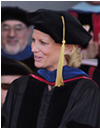2001 Metcalf Award Winner
Lisa Sullivan
 “I was trembling and petrified,” recalls a student, aptly mixing her metaphors. What Godzilla of a subject can induce simultaneous jitters and paralysis?
“I was trembling and petrified,” recalls a student, aptly mixing her metaphors. What Godzilla of a subject can induce simultaneous jitters and paralysis?
It is the first day of Professor Lisa Sullivan’s required introductory statistics class, and fear pervades the room. One student looks out the window wanly hoping that a near-earth asteroid will break orbit, hurtle through the atmosphere, and cancel today’s class—along with sentient life on earth. Another pens in quiet protest across her notebook Mark Twain’s aphoristic judgment: “There are three kinds of lies: lies, damn lies, and statistics.” Look across the classroom and behold all the postures of resignation, despair, and impending doom known to student-kind. In walks Professor Sullivan.
And so begins another profound transformation. By the end of the semester, more than a few self-proclaimed “math cripples” in the College of Arts and Sciences will have added statistics minors to their programs. In the School of Public Health, the number of students concentrating in epidemiology and biostatistics will once again soar. And that cloud of doom with which the semester began will be replaced with radiant confidence and illuminating competence.
Professor Sullivan wrings this transformation not by substituting entertaining stories and tricks for a rigorous syllabus, nor by offering Romper Room reassurance in place of reality. No one says that her classes are easy, or that the minutes fly by in unadulterated fun. She is, rather, a teacher in Plato’s sense: the one who returns to the cave to lead others to the light.
One student describes Professor Sullivan’s teaching as a “mix of joyful energy, humor, intelligence, and respect.” Another describes Professor Sullivan “entering the lecture hall every day firmly convinced of the value of biostatistics and the value of her students.” She turns statistics, says another, “from a necessary evil” into “an art form”—an art, says another, comprised of “meticulous preparation, engaging lectures, and remarkable accessibility.”
“Her attention never flags,” says one student; another adds, “Professor Sullivan is concerned about the personal journey of every student through her class.” And yet another remarks, “She has the patience of a god.”
Still another student—perhaps the one who etched that epithet about damn lies on her notebook—concludes that Professor Sullivan led us “math-fearing humanities and psychology majors through the ins and outs of statistical analysis with her acerbic wit and a dry irony worthy of Mark Twain. She instilled a sense of responsibility and deference for the power of the subject. She taught us the concepts of p-values and t-distributions, but also the limits of statistical inference.”
Professor Sullivan uses the stuff of public health to teach statistics to Public Health students. As statistician to the Framingham Heart Study, and an accomplished researcher of HIV patients, drug abusers, alcoholics, breast cancer patients, and diabetics, she brings to her classes an abundance of examples that testify to the moral seriousness of her craft. And her students take heed.
Tranquil in the face of the discouraged and the daunted, tireless in invention, and fierce in her commitment to her students’ success, Professor Lisa Sullivan has, to a statistical certainty of p=1, earned the Metcalf Award for Excellence in Teaching.
